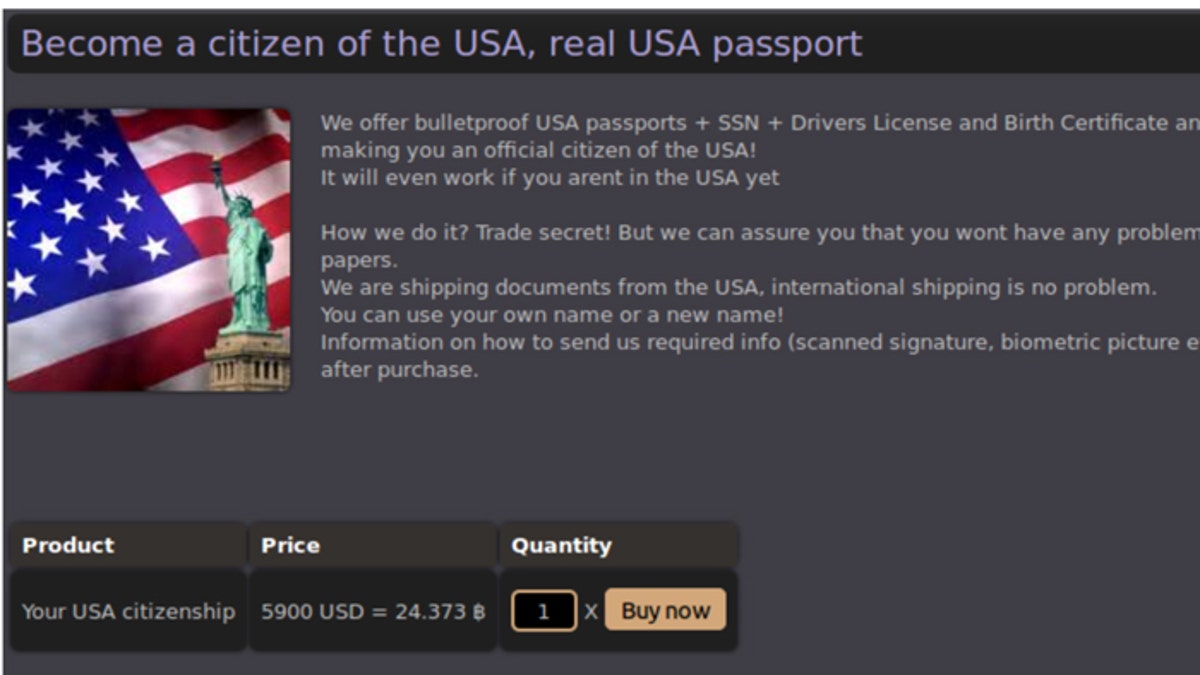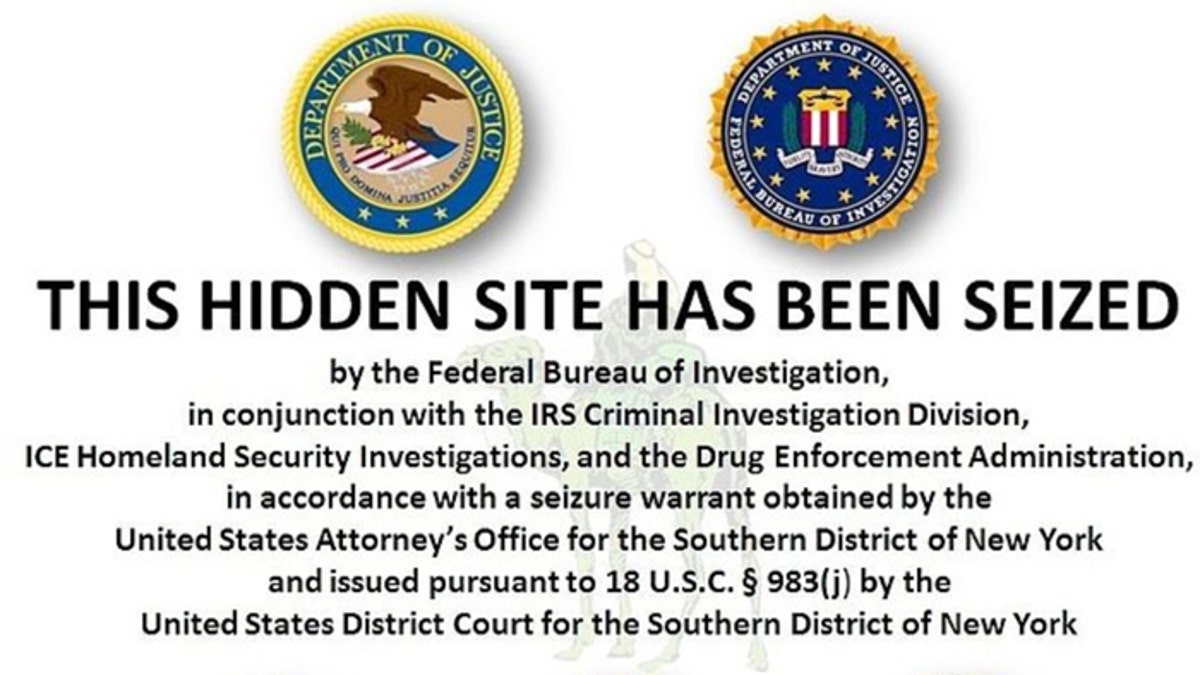
This screengrab from a darknet site show some of the illegal items available for purchase.
A new identity, a life-saving kidney, credit card numbers or even the murder of a troublesome business partner are all a few clicks away on the so-called “darknet,” the seedy underbelly of the Internet that search engines don’t plumb and most people never surf.
While what’s for sale on the Wild West of the web has always been disturbing, tech experts from around the world attending the 2015 RSA Conference in San Francisco this week said the transactions on the darknet are increasingly alarming, and they are doing what they can to stop abuses and protect consumers and clients.
“The darknet is that part of the Internet where most people don’t go — for a reason,” said Mark Turnage, CEO of the Colorado-based One World Labs, a company that specializes in protecting corporations and individuals from transactions on the darknet.“It is the black market of the Internet — where stolen information is bought and sold. It is where illegal transactions take place.”
“The darknet is that part of the Internet where most people don’t go — for a reason."
"Darknet" refers to any private network where connections are made between groups of "friends," or people with common interests, using non-standard protocols and ports. Special software is typically required to access them, and as part of what is known as the larger "deep web," search engines such as Google, Yahoo! and Bing do not crawl darknets for data. You won’t stumble upon a darknet by accident, which is a good thing.
Perusing the darknet offers a jarring jaunt through jaw-dropping depravity: Galleries of child pornography, videos of humans having sex with animals, offers for sale of illegal drugs, weapons, stolen credit card numbers and fake identifications for sale. Even human organs reportedly from Chinese execution victims are up for sale on the darknet.
Another series of vendors claim to be experienced hit men for hire who will “neutralize” targets effectively and affordably. A search of the web for hit men on OWL software — the sort of Google for the darknet — turns up 700,000 hit men leads and stiff competition among these self-proclaimed murderers.

Mark Turnage, of One World Labs, warns that even venturing on to the darknet carries risk.
One self-professed killer for hire with a business called the “Unfriendly Solution” promises to murder any target within two to five weeks for a fee ranging from $7,000 to $15,000, in addition to money for travel expenses and weapons.
“I will neutralize the ex you hate, your bully, a policeman you’ve been in trouble with, a lawyer, a small politician … I do not care what the cause is,” reads the pitch from a man who claims seven years' experience and a total lack of "empathy for humans."
Another vendor promises that those seeking U.S. citizenship can purchase a package for $1,500, to include a fake U.S. passport, drivers license, birth certificate, and Social Security number that would all be delivered by free express shipping.
While prostitution services are rampant on the darknet, some groups offer “sex slaves” for sale, saying “nothing is too extreme for however long you want.”
A group called Portugal Dark Side, claims to sell “slaves, both male for forced labor, and women ranging from 14-30 years of age for sex slaves.” The prices for these "slaves" range from 5,000 to 30,000 euros.
The politically powerful are sometimes exposed on the darknet. One hacker claimed to post the personal information of former Secretary of State Hillary Clinton, National Security Agency Director Gen. Keith Alexander, and U.S. Attorney General Eric Holder.
Here, on the once off-the-grid segment of cyberspace started by the U.S. government as a way for government officials to secretly and conveniently share information, many of the transactions are now done through the international digital currency Bitcoin. The some 2.5 million daily users who browse 100 million URLs and 32,000 web pages can hide their identities from anyone conducting surveillance through a special browser.
Some hackers and hacking groups share information on the darknet about their targets and things they’ve stolen such as usernames and passwords, said Ron Gula, CEO of Tenable Network Security.
“Commercial intelligence services, which monitor technologies associated with darknet, can be used to alert if sensitive information about your company has been shared,” Gula told FoxNews.com.

Federal authorities police the darknet, shutting down sites that offers services including murder, organs and private financial information. (Screengrab)
The Colorado-based OWL developed proprietary software that safely scrapes the entire darknet daily to find out whether their clients’ data has been stolen and also acts as a search engine for the dark web like Google or Bing does for the regular Internet. Their extensive list of clients includes financial and medical institutions and manufacturers.
“OWL is the early warning system for the darknet — we watch what is happening 24/7, and can alert companies and consumers to the presence of their data, IP, goods, and confidential information being online—often before it is exploited before the bad guys,” Turnage said. “We believe OWL's database of darknet content is the largest in the world outside the federal government.”
Tech experts warn those who venture on to the darknet without proper protection can easily become targets of hackers who can place malicious software on their computer and steal their data and identity.
“Wandering the darknet is like walking down a very dark alley in the middle of the night—an alley where people are regularly mugged,” Turnage of OWL said. “You can get badly burned trying to do this on your own.”
“The same techniques hackers can use to target Internet users also apply to these less frequented parts of the Internet,” Gula added.
Children who venture on to the darknet could get their phones or computers infected with malware or be harassed, Gula said.
“Parents and teachers should remind their kids and students if they are going to darknet sites to watch movies, download comic books or stream music for free that these are great ways to get their phones and laptops infected with malware,” Gula asserted. “Parents and teachers should ask their kids and students how they are communicating with their friends and if any online anonymous conversations have been harassing.”
The FBI, IRS Criminal Investigation Division, Homeland Security Investigations, and the Drug Enforcement Agency are among the federal agencies policing the dark web, sometimes acting as buyers or sellers of illicit services or contraband products.
Once a site is seized and closed down, the agencies post a notice saying “This hidden site has been seized.”
However, often tech savvy criminal elements typically can reopen their business on another web page within a very short time, making the challenge to police the Internet all the more difficult.








































